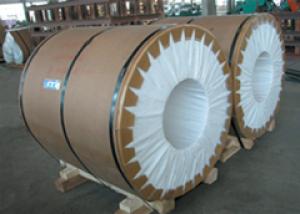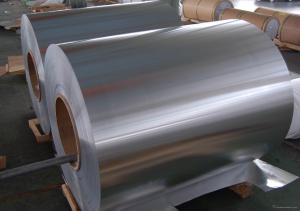Goods Aluminum coil with smooth surface
- Loading Port:
- China Main Port
- Payment Terms:
- TT OR LC
- Min Order Qty:
- -
- Supply Capability:
- -
OKorder Service Pledge
Quality Product, Order Online Tracking, Timely Delivery
OKorder Financial Service
Credit Rating, Credit Services, Credit Purchasing
You Might Also Like
Alloy: AA 5052
Temper:H14/16/18/22/24/32,HO etc.
Thickness:0.2mm—100mm
Width:100mm—2300mm (Can be slitted)
InnerDiameter: 508MM
CoilWeight:500kg-3000kg(Max.)
Application: Foil stock, Circles, Roofing, Canstock, Marine plate,Anti-sliperypurpose in vehicles, packing and appliance.
- Q:How are aluminum coils processed for specific applications?
- Aluminum coils are processed for specific applications through a series of steps that include cleaning, rolling, annealing, and coating. First, the coils are cleaned to remove any impurities or contaminants. Then, they are passed through a rolling mill to reduce the thickness and increase the length. Annealing is done to improve the metal's mechanical properties by heating and then slowly cooling it. Finally, a coating may be applied to enhance the coils' corrosion resistance, appearance, or specific functionality, depending on the intended application.
- Q:I had a physics exams today and it was asking whether or not a shiny surface aluminium blanket was suitable to keep the sleeper warm. I put that because it's a conductor of electricitiy, heat loss will be greater so it wont be suitable for keeping him warm. On the other hand, some other people said that because it had a shiny surface, thus a good reflector of heat, it would be suitable for keeping him warm. Are both arguments correct?
- Electrical conductivity has nothing to do with it. Emergency blankets of the type you describe have much lower thermal conductivity than metallic aluminium. The shiny surfaces both reflect body heat back to the body and do not radiate heat away. The sun is not involved in its operation as they work equally well at night or in other unlit places.
- Q:Can aluminum coils be used in signage applications?
- Indeed, signage applications can make use of aluminum coils. The durability, corrosion resistance, and lightweight characteristics of aluminum render it a favored material for signage purposes. Aluminum can effortlessly take on different shapes and sizes, making it suitable for a wide range of signage types, including outdoor signs, billboards, trade show displays, and more. Furthermore, aluminum coils boast exceptional weather resistance, guaranteeing the preservation of the signage's integrity and vibrancy even in harsh environmental circumstances. The versatility and longevity of aluminum establish it as the preferred option for signage applications across diverse industries.
- Q:What is virgin aluminum? I can't find anything about it, is it just another word for aluminum? Is there a difference?
- virgin aluminum is, aluminum that has not been printed on, mixed with other metals etc. It is simply a more pure form of aluminum and will net more upon resale to a junkman
- Q:What are the different yield strengths of aluminum coils?
- The yield strengths of aluminum coils can vary depending on the specific grade and temper of the aluminum. Generally, the range of yield strengths for aluminum coils can be anywhere from 15,000 to 75,000 pounds per square inch (psi).
- Q:Can aluminum coils be used for window frames?
- Certainly, window frames can indeed be made using aluminum coils. Aluminum is widely favored for window frames owing to its enduring nature, lightweight composition, and ability to resist corrosion. It is extensively employed in both residential and commercial settings. Aluminum coils can be effortlessly molded and adjusted to accommodate diverse window dimensions and designs. Additionally, aluminum frames provide exceptional thermal insulation qualities, thereby enhancing energy efficiency in structures. All in all, aluminum coils represent a dependable and pragmatic choice for constructing window frames.
- Q:Can aluminum coils be used in aerospace applications?
- Yes, aluminum coils can be used in aerospace applications. Aluminum is a lightweight and durable material that offers excellent heat conductivity and corrosion resistance, making it suitable for various aerospace components like heat exchangers, condensers, and cooling systems. Its versatility and strength-to-weight ratio make aluminum coils a popular choice in the aerospace industry.
- Q:Can aluminum coils be used in low-friction applications?
- Yes, aluminum coils can be used in low-friction applications. Aluminum is a lightweight and corrosion-resistant material that has excellent thermal conductivity. These properties make it suitable for various applications where low-friction is desired. In industries such as automotive, aerospace, and HVAC systems, aluminum coils are often used in heat exchangers, evaporators, condensers, and cooling coils. These coils are designed to efficiently transfer heat, while minimizing friction and energy loss. Additionally, aluminum coils can be used in electrical motors, generators, and transformers, where low friction is essential for smooth operation and reduced energy consumption. The lightweight nature of aluminum also helps to reduce the overall weight of the system, leading to improved efficiency. Furthermore, aluminum coils can be utilized in various types of machinery and equipment that require low friction, such as conveyor systems, sliding mechanisms, and bearings. Aluminum's low coefficient of friction allows for smooth and efficient movement, minimizing wear and tear on the components. Overall, aluminum coils are a versatile solution for low-friction applications due to their lightweight, corrosion-resistant, and thermally conductive properties. Their use can lead to improved energy efficiency, reduced maintenance costs, and enhanced performance in a wide range of industries.
- Q:How do aluminum coils compare to other types of metal coils?
- Aluminum coils have several advantages and disadvantages when compared to other types of metal coils. One of the main advantages of aluminum coils is their lightweight nature. Aluminum is significantly lighter than other metals such as copper or steel, making it easier to handle and transport. This lightweight property also makes aluminum coils more cost-effective in terms of shipping and installation. Furthermore, aluminum coils are highly resistant to corrosion, which is a significant advantage in many applications, especially in humid or corrosive environments. This resistance to corrosion makes aluminum coils suitable for outdoor use, such as in air conditioning systems or refrigeration units. Additionally, aluminum coils have excellent thermal conductivity, allowing for efficient heat transfer. This property makes them highly efficient in heat exchange applications, such as in HVAC systems or automotive radiators. However, aluminum coils also have some drawbacks. Compared to copper coils, aluminum coils have lower electrical conductivity, which can result in higher energy consumption and reduced efficiency in certain applications. Additionally, aluminum is a softer metal than copper or steel, which means that aluminum coils may be more susceptible to damage or bending. In summary, aluminum coils offer advantages such as lightweight, corrosion resistance, and thermal conductivity. However, they may have lower electrical conductivity and be more prone to damage compared to other types of metal coils. The choice between aluminum coils and other types of metal coils ultimately depends on the specific application and its requirements.
- Q:If the aluminum coil is 220 kg, 0.3 thick and 500 wide, how much is the coil diameter?
- With the outer diameter and inner diameter, you can know the volume. With the density and volume, we can calculate the weight. And with weight, we can know the length.
1. Manufacturer Overview |
|
|---|---|
| Location | |
| Year Established | |
| Annual Output Value | |
| Main Markets | |
| Company Certifications | |
2. Manufacturer Certificates |
|
|---|---|
| a) Certification Name | |
| Range | |
| Reference | |
| Validity Period | |
3. Manufacturer Capability |
|
|---|---|
| a)Trade Capacity | |
| Nearest Port | |
| Export Percentage | |
| No.of Employees in Trade Department | |
| Language Spoken: | |
| b)Factory Information | |
| Factory Size: | |
| No. of Production Lines | |
| Contract Manufacturing | |
| Product Price Range | |
Send your message to us
Goods Aluminum coil with smooth surface
- Loading Port:
- China Main Port
- Payment Terms:
- TT OR LC
- Min Order Qty:
- -
- Supply Capability:
- -
OKorder Service Pledge
Quality Product, Order Online Tracking, Timely Delivery
OKorder Financial Service
Credit Rating, Credit Services, Credit Purchasing
Similar products
New products
Hot products
Related keywords





























